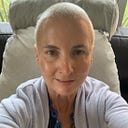Learning to Say NO!
“I Say no to what’s draining
Say no to what’s unfulfilling
Say no to what’s not loving
Say no to the muddy water
that poisons you
even if that’s all you know
What you drank
was not meant to be
the nourishing well
that gives you life
Surrender your cup
You will be free.“ — Afiyah The Poet
I used to have a Japanese Kabuki Noh Mask on my wall. Like the Mona Lisa, the “smile” on the mask, was exactly that: a mask. Neither happy, nor sad, a yes or a no. It was an acquiescence to indecision, pliability, and subtlety. But ultimately it represented a willingness to compromise to the wishes of what others chose to interpret. Coy femininity (though in Kabuki, men always wore the masks) to capture the fleeting interest of someone else rather than standing firm in one’s own self-value. And much like the mask, I lived a pliable, “easy-going” existence, that ironically was the exact opposite of being easy-going. Instead, it was humiliating and utterly exhausting, not to mention emotionally and mentally degrading and stressful. Constantly trying to anticipate internally who would actually respond positively and appreciate me rather than push me further into self- compromise, expect me to bend over more, and send me further behind my mask of calm unemotive acceptance. Because I’d been taught from childhood, “Yes, would open doors to new life opportunities, new dates, new jobs. And while that may be true to a certain extent, defaulting to “yes” to everyone else at every turn left no room for me. I even forgot what I actually wanted. Because clearly it didn’t matter anyway. Even if I remembered to voice it. Since no one heard.
What I didn’t understand at the time, and I’d guess many more like me, was that rather than increasing my value every time I said — “OK. Not a problem. No worries. Or “I’ll tale that on” — did the reverse. It made me a foregone conclusion, and therefore, subject to more abuse, neglect and self-compromise. Because every time I’d said “OK”, yet another personal boundary had fallen. And another assumption about my lack of self-worth rose up in its place.
Until 2017, when I really did have a thorough mental breakthrough, breakdown and visceral response of “NO! “NO MORE!” All that compromise — especially to family members — had nearly killed me with the stress and constant self-doubt. And despite how difficult it was for me to voice at the time, my sense of personal freedom and pride grew enormously. I was recently reminded of that this [past week, when my dear friend and great legal advisor repeated to me once again. “The most powerful word in the English language is NO!” Committed to taking a flashlight up the asses of my persecutors, he demanded, in no uncertain or hyperbolic terms, that the time for compromise was over. And we will be going to court in Bermuda.
And I was immensely grateful for that reminder, because it pulled me up short on saying “OK, No problem” to a family member again who had just decided to inform me that a night of football on TV was more valuable than time with me. I’d been continuing to let this person slide despite on-going reminders that I’d felt neglected and left out. But no more. My time, my presence and my life have immense value to me and others too. And it’s time that person recognize I’m more valuable to me than they are. As is my freedom to use my time a I wish.
So, for those of you still holding onto that hesitation at saying no. Please remember, YOUR VALUE IS YOURS. YOUR CHOICE IS YOURS. The only way to know how much you are valued by others is to say no, and see what happens. You might get a pleasant surprise, or you might just have set a new standard for yourself. Either way, you will have lost nothing. And gained a great deal.
Holly Lynch is a 20+ year ESG and DEI communications veteran, board member, strategist and investor who has helped individuals and companies tackle the toughest challenges, transitions and transformations in their worlds. Having survived countless life setbacks and two rounds with terminal cancer, while seeing the country-wide collapse of the systems and safety nets for the most vulnerable in and outside our communities, she is now shifting her life and career trajectories to focus on coaching and consulting with those facing down fundamental shifts and transitions as they try to adapt to change while rebuilding their lives and businesses during these unprecedented times.
